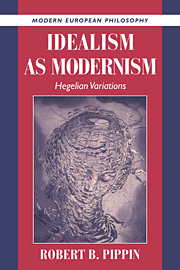Book contents
- Frontmatter
- Contents
- Acknowledgments
- Abbreviations
- Dedication
- 1 Introduction: Hegelianism?
- Part One The Original Options: Kant Versus Hegel
- Part Two Critical Modernism
- Part Three Greeks, Germans, and Moderns
- Part Four Narrating Modernity
- Part Five Modernism and Nihilism
- 12 Truth and Lies in the Early Nietzsche
- 13 Nietzsche's Alleged Farewell: The PreModern, Modern, and Postmodern Nietzsche
- 14 Morality as Psychology, Psychology as Morality: Nietzsche, Eros, and Clumsy Lovers
- Part Six Heidegger's “Cuhnination”
- Part Seven Hegelianism
- Name Index
- Subject Index
12 - Truth and Lies in the Early Nietzsche
Published online by Cambridge University Press: 05 June 2012
- Frontmatter
- Contents
- Acknowledgments
- Abbreviations
- Dedication
- 1 Introduction: Hegelianism?
- Part One The Original Options: Kant Versus Hegel
- Part Two Critical Modernism
- Part Three Greeks, Germans, and Moderns
- Part Four Narrating Modernity
- Part Five Modernism and Nihilism
- 12 Truth and Lies in the Early Nietzsche
- 13 Nietzsche's Alleged Farewell: The PreModern, Modern, and Postmodern Nietzsche
- 14 Morality as Psychology, Psychology as Morality: Nietzsche, Eros, and Clumsy Lovers
- Part Six Heidegger's “Cuhnination”
- Part Seven Hegelianism
- Name Index
- Subject Index
Summary
Nietzsche is well known for a critique of the classical philosophical tradition. But there is an obvious problem in understanding this critique. At points it seems completely dismissive to hold that philosophy itself is pathological, always a symptom or sign of a kind of spiritual and ethical degeneration, a self-destructive hatred of life. (Just as there cannot be a “good” version of alchemy, astrology, or misogyny, there cannot be an improved or better version of such a sickness.) At other points, this critique only seems aimed at essentialist or metaphysically realist, or dualist, or Platonic–Christian philosophy, naturally raising the question of the Nietzschean philosophical alternative, the nature of the authority with which Nietzsche proclaims it, and the relation of such an alternative to the much criticized asceticism.
There are scores of ways of considering Nietzsche's texts in order to raise this question. I shall concentrate on an early version: the contrast between the tragic and the Socratic point of view, and its implications in Nietzsche's work of the early 1870s. I raise this question because of some dissatisfaction with many widely known and influential characterizations of Nietzsche's relation to traditional philosophy. These include various characterizations of Nietzsche:
The last metaphysician of the Western tradition. By being wedded to a radical and unprecedented metaphysics of the will to power, according to Heidegger, Nietzsche supposedly reveals the underlying assumptions of all modern philosophy and so the unavoidable nihilism that is the fate of all post-Platonic philosophy.
- Type
- Chapter
- Information
- Idealism as ModernismHegelian Variations, pp. 311 - 329Publisher: Cambridge University PressPrint publication year: 1997
- 3
- Cited by



